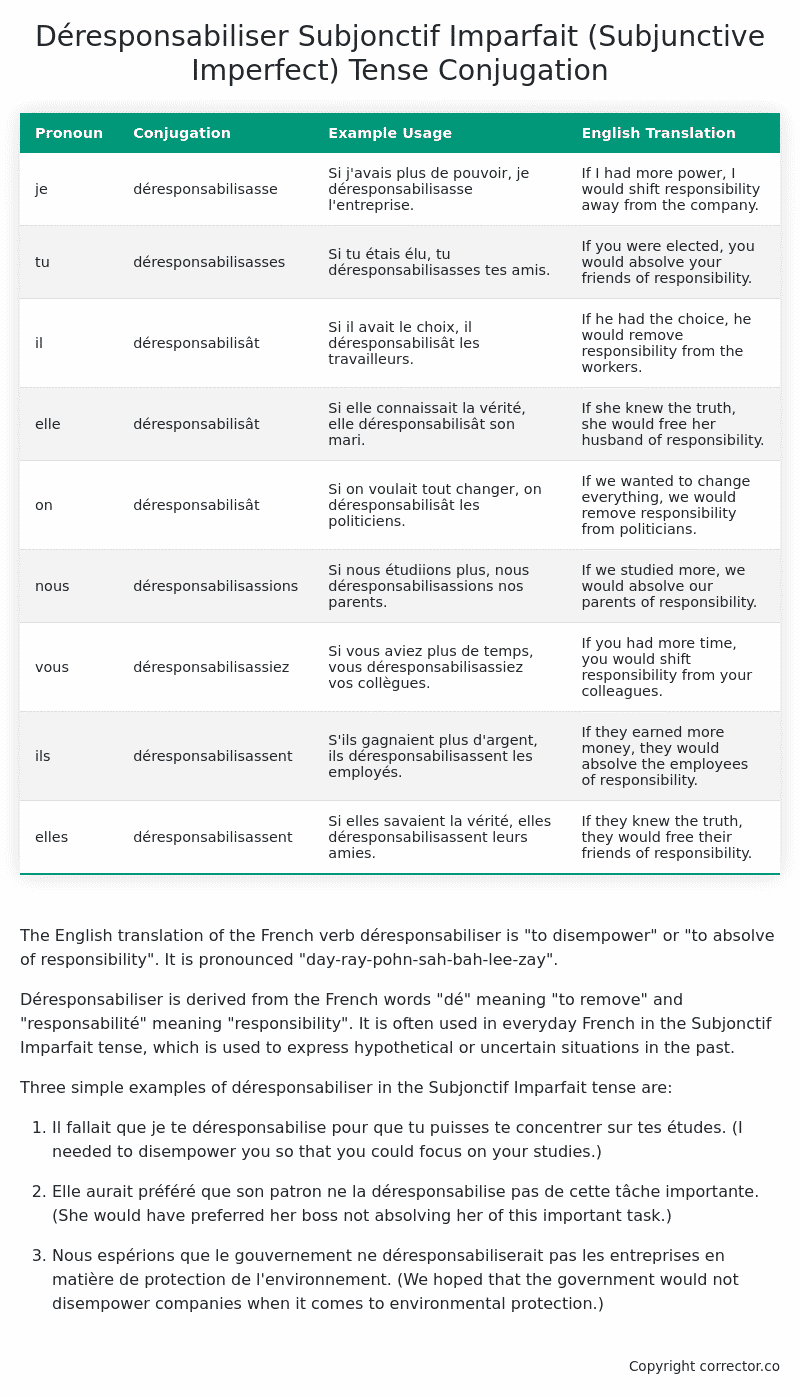Subjonctif Imparfait (Subjunctive Imperfect) Tense Conjugation of the French Verb déresponsabiliser
Introduction to the verb déresponsabiliser
The English translation of the French verb déresponsabiliser is “to disempower” or “to absolve of responsibility”. It is pronounced “day-ray-pohn-sah-bah-lee-zay”.
Déresponsabiliser is derived from the French words “dé” meaning “to remove” and “responsabilité” meaning “responsibility”. It is often used in everyday French in the Subjonctif Imparfait tense, which is used to express hypothetical or uncertain situations in the past.
Three simple examples of déresponsabiliser in the Subjonctif Imparfait tense are:
-
Il fallait que je te déresponsabilise pour que tu puisses te concentrer sur tes études. (I needed to disempower you so that you could focus on your studies.)
-
Elle aurait préféré que son patron ne la déresponsabilise pas de cette tâche importante. (She would have preferred her boss not absolving her of this important task.)
-
Nous espérions que le gouvernement ne déresponsabiliserait pas les entreprises en matière de protection de l’environnement. (We hoped that the government would not disempower companies when it comes to environmental protection.)
Table of the Subjonctif Imparfait (Subjunctive Imperfect) Tense Conjugation of déresponsabiliser
| Pronoun | Conjugation | Example Usage | English Translation |
|---|---|---|---|
| je | déresponsabilisasse | Si j’avais plus de pouvoir, je déresponsabilisasse l’entreprise. | If I had more power, I would shift responsibility away from the company. |
| tu | déresponsabilisasses | Si tu étais élu, tu déresponsabilisasses tes amis. | If you were elected, you would absolve your friends of responsibility. |
| il | déresponsabilisât | Si il avait le choix, il déresponsabilisât les travailleurs. | If he had the choice, he would remove responsibility from the workers. |
| elle | déresponsabilisât | Si elle connaissait la vérité, elle déresponsabilisât son mari. | If she knew the truth, she would free her husband of responsibility. |
| on | déresponsabilisât | Si on voulait tout changer, on déresponsabilisât les politiciens. | If we wanted to change everything, we would remove responsibility from politicians. |
| nous | déresponsabilisassions | Si nous étudiions plus, nous déresponsabilisassions nos parents. | If we studied more, we would absolve our parents of responsibility. |
| vous | déresponsabilisassiez | Si vous aviez plus de temps, vous déresponsabilisassiez vos collègues. | If you had more time, you would shift responsibility from your colleagues. |
| ils | déresponsabilisassent | S’ils gagnaient plus d’argent, ils déresponsabilisassent les employés. | If they earned more money, they would absolve the employees of responsibility. |
| elles | déresponsabilisassent | Si elles savaient la vérité, elles déresponsabilisassent leurs amies. | If they knew the truth, they would free their friends of responsibility. |
Other Conjugations for Déresponsabiliser.
Le Present (Present Tense) Conjugation of the French Verb déresponsabiliser
Imparfait (Imperfect) Tense Conjugation of the French Verb déresponsabiliser
Passé Simple (Simple Past) Tense Conjugation of the French Verb déresponsabiliser
Passé Composé (Present Perfect) Tense Conjugation of the French Verb déresponsabiliser
Futur Simple (Simple Future) Tense Conjugation of the French Verb déresponsabiliser
Futur Proche (Near Future) Tense Conjugation of the French Verb déresponsabiliser
Plus-que-parfait (Pluperfect) Tense Conjugation of the French Verb déresponsabiliser
Passé Antérieur (Past Anterior) Tense Conjugation of the French Verb déresponsabiliser
Futur Antérieur (Future Anterior) Tense Conjugation of the French Verb déresponsabiliser
Subjonctif Présent (Subjunctive Present) Tense Conjugation of the French Verb déresponsabiliser
Subjonctif Passé (Subjunctive Past) Tense Conjugation of the French Verb déresponsabiliser
Subjonctif Imparfait (Subjunctive Imperfect) Tense Conjugation of the French Verb déresponsabiliser (this article)
Conditionnel Présent (Conditional Present) Tense Conjugation of the French Verb déresponsabiliser
Conditionnel Passé (Conditional Past) Tense Conjugation of the French Verb déresponsabiliser
L’impératif Présent (Imperative Present) Tense Conjugation of the French Verb déresponsabiliser
L’infinitif Présent (Infinitive Present) Tense Conjugation of the French Verb déresponsabiliser
Struggling with French verbs or the language in general? Why not use our free French Grammar Checker – no registration required!
Get a FREE Download Study Sheet of this Conjugation 🔥
Simply right click the image below, click “save image” and get your free reference for the déresponsabiliser Subjonctif Imparfait tense conjugation!

Déresponsabiliser – About the French Subjonctif Imparfait (Subjunctive Imperfect) Tense
Formation
Common Everyday Usage Patterns
Interactions with Other Tenses
Subjonctif Présent
Indicatif Passé Composé
Conditional
Conditional Perfect
Summary
I hope you enjoyed this article on the verb déresponsabiliser. Still in a learning mood? Check out another TOTALLY random French verb conjugation!


